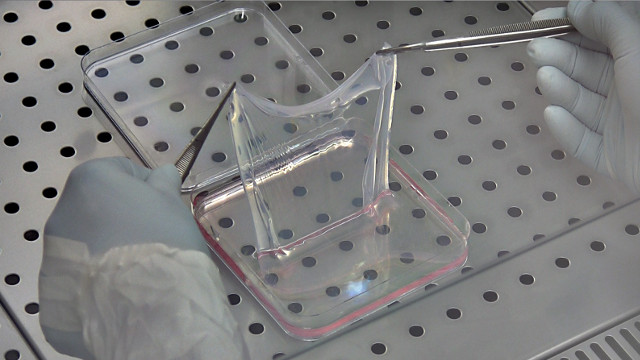Modeling TGF-β signaling in human skin
Studies in mice and human tumors have identified multiple roles for TGF-β signaling in normal skin biology and in the development and progression of skin cancers. To investigate the requirements for TGF-β signaling in human epidermal development and homeostasis, Ye et al. performed phenotypic and quantitative proteomic and phosphoproteomic analyses of an in vitro model of stratified human epidermis with knockout of individual TGF-β signaling components. Whereas SMAD4-dependent signaling was important for limiting epidermal proliferation and promoting differentiation and cell adhesion, SMAD4-independent signaling was important for preventing invasive growth by suppressing signaling through MAPK pathways. The proteomic and phosphoproteomic data will enable future studies investigating TGF-β signaling in normal and pathological contexts, and the human epidermis model could be exploited for future drug discovery efforts.
Abstract
Transforming growth factor–β (TGF-β) signaling regulates various aspects of cell growth and differentiation and is often dysregulated in human cancers. We combined genetic engineering of a human organotypic three-dimensional (3D) skin model with global quantitative proteomics and phosphoproteomics to dissect the importance of essential components of the TGF-β signaling pathway, including the ligands TGF-β1, TGF-β2, and TGF-β3, the receptor TGF-βRII, and the intracellular effector SMAD4. Consistent with the antiproliferative effects of TGF-β signaling, the loss of TGF-β1 or SMAD4 promoted cell cycling and delayed epidermal differentiation. The loss of TGF-βRII, which abrogates both SMAD4-dependent and SMAD4-independent downstream signaling, more strongly affected cell proliferation and differentiation than did loss of SMAD4, and it induced invasive growth. TGF-βRII knockout reduced cell-matrix interactions, and the production of matrix proteins increased the production of cancer-associated cell-cell adhesion proteins and proinflammatory mediators and increased mitogen-activated protein kinase (MAPK) signaling. Inhibiting the activation of the ERK and p38 MAPK pathways blocked the development of the invasive phenotype upon the loss of TGF-βRII. This study provides a framework for exploring TGF-β signaling pathways in human epithelial tissue homeostasis and transformation using genetic engineering, 3D tissue models, and high-throughput quantitative proteomics and phosphoproteomics.







